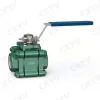What is the purpose of the ball valve?
In the intricate world of fluid control, ball valves stand as essential components, playing a crucial role in regulating the flow of liquids and gases. These valves have become ubiquitous in various industries due to their efficiency, reliability, and versatility. In this article, we will delve into the purpose of ball valves, exploring their design, functionality, and applications.
Overview of Ball Valves:
A ball valve is a quarter-turn valve that uses a spherical disc to control the flow of fluids. The sphere, often referred to as the ball, has a hole or port drilled through its center. When the valve is in the open position, this port allows the fluid to flow through, and when it is in the closed position, the port is perpendicular to the flow, preventing passage of the fluid.
Design and Components:
Ball valves typically consist of three main components: the body, the ball, and the actuator. The body is the outer shell that houses the internal components and provides the connection points for pipes. The ball, as mentioned earlier, is the sphere with the central port. The actuator is the mechanism that controls the position of the ball, allowing for the opening and closing of the valve.
The Purpose of Ball Valves:
Efficient Flow Control: One of the primary purposes of ball valves is to regulate and control the flow of fluids with precision. The quarter-turn operation of the valve allows for quick and reliable on/off control, making it particularly useful in applications where rapid response is crucial.

Versatility: Ball valves find applications across a wide range of industries due to their versatility. They can handle various types of fluids, including corrosive chemicals, gases, and abrasive materials. This adaptability makes them suitable for applications in chemical plants, water treatment facilities, oil and gas industries, and more.
Durability and Reliability: The robust design of ball valves contributes to their durability and reliability. The simplicity of the construction, with fewer moving parts compared to other valve types, minimizes the risk of failure and ensures a longer service life. This makes ball valves an economical choice for industries that require low-maintenance solutions.
Bi-directional Sealing: Ball valves offer bi-directional sealing, meaning they can effectively seal against flow in both directions. This characteristic makes them suitable for applications where preventing backflow is crucial.
Quick and Easy Operation: The quarter-turn operation of flow control ball valves allows for swift and straightforward control. This feature is advantageous in situations where rapid response to changing conditions or emergencies is essential.
Applications of Ball Valves:
Oil and Gas Industry: Ball valves are widely used in the oil and gas industry for controlling the flow of crude oil, natural gas, and various chemicals. Their ability to operate in high-pressure and high-temperature environments makes them indispensable in this sector.
Chemical Processing Plants: In chemical processing plants, where the handling of corrosive and abrasive materials is common, ball valves provide a reliable solution for fluid control. The chemical resistance of materials used in ball valve construction is a key factor in their suitability for this application.
Water Treatment Facilities: Ball valves play a crucial role in water treatment processes, regulating the flow of water and various chemicals. Their quick response and reliable sealing are vital in maintaining the efficiency of water treatment systems.
Conclusion:
In conclusion, ball valves serve a fundamental purpose in fluid control, offering efficiency, versatility, and reliability across a spectrum of industries. Their design, featuring a simple yet effective mechanism, makes them indispensable for applications ranging from oil and gas to water treatment. As technology continues to advance, the role of ball valves in ensuring precise fluid regulation is likely to remain pivotal in various industrial processes.
356
0
0


Comments
All Comments (0)